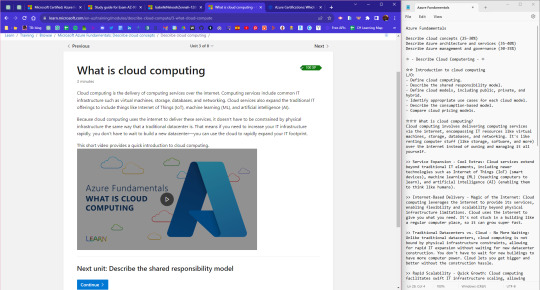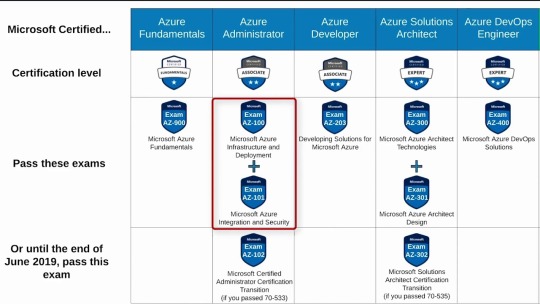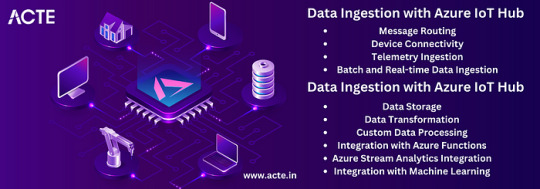#Microsoft Azure cloud
Explore tagged Tumblr posts
Text
Expert Cloud Consulting Services provide Microsoft azure cloud services, Azure AD Support Services, azure AD migration services, Active Directory & Azure AD Support, Microsoft azure security consulting services at best cost in pune, Mumbai, India https://expertcloudconsulting.com/azure
#microsoft azure cloud#azure cloud computing#microsoft azure services#azure cloud services#Azure AD Support Services
0 notes
Text
Explore the most popular Azure services and products of 2024. This list outlines the top tools and services businesses rely on for cloud computing, data management, AI, and security, helping you make informed technology choices.
#Azure services 2024#top Azure products#Microsoft Azure cloud#cloud computing with Azure#popular Azure tools.
0 notes
Text
How Leading Companies Are Leveraging Infrastructure as a Service (IaaS)
As businesses increasingly turn to digital solutions, Infrastructure as a Service (IaaS) has emerged as a vital component for modern enterprises. By utilizing cloud platforms, companies can enhance their agility, scalability, and cost-efficiency. This article explores infrastructure as a service examples and how leading companies are leveraging IaaS providers to drive innovation and growth.
What is Infrastructure as a Service (IaaS)?
IaaS is a cloud computing service model that delivers virtualized computing resources over the internet. It enables businesses to rent infrastructure components like servers, storage, and networking, rather than investing in physical hardware. This flexibility allows companies to scale resources according to their needs and focus on core activities without the burden of managing IT infrastructure.
1. Netflix: Enhancing Scalability and Performance
Cloud Infrastructure Examples
Netflix, the global streaming giant, leverages IaaS to manage its vast content library and ensure seamless streaming experiences for millions of users worldwide. By using IaaS providers like Amazon Web Services (AWS), Netflix can quickly scale its infrastructure to handle peak loads, such as new releases or seasonal spikes in viewership. This scalability ensures high performance and availability, crucial for maintaining customer satisfaction.
2. Airbnb: Optimizing Resource Management
IaaS Use Cases
Airbnb, the popular online marketplace for lodging, utilizes IaaS to manage its global operations. The company employs cloud services examples like dynamic scaling to match infrastructure resources with fluctuating demand. During peak travel seasons or significant events, Airbnb can scale up its infrastructure to accommodate increased traffic, ensuring reliable service and user experience.
3. Slack: Ensuring Data Security and Compliance
Cloud Platforms
Slack, a leading collaboration platform, relies on IaaS for data security and regulatory compliance. By partnering with IaaS providers like Google Cloud Platform (GCP), Slack benefits from advanced security features, including encryption and compliance with industry standards such as GDPR and HIPAA. This ensures that sensitive business communications remain secure and compliant with regulations.
4. Pinterest: Enhancing Development and Innovation
IaaS Providers
Pinterest, a visual discovery and bookmarking platform, leverages IaaS to accelerate development cycles and foster innovation. Using cloud platforms like Microsoft Azure, Pinterest provides its developers with the tools and resources needed to build, test, and deploy new features rapidly. This agile development environment supports continuous improvement and innovation.
5. Spotify: Delivering Seamless Music Streaming
Cloud Infrastructure Examples
Spotify, the music streaming service, utilizes IaaS to manage its extensive music catalog and deliver high-quality streaming experiences. By using cloud platforms like Google Cloud, Spotify ensures that users can access their favorite music anytime, anywhere. The scalable infrastructure allows Spotify to handle millions of concurrent users without compromising performance.
6. Coca-Cola: Supporting Global Operations
IaaS Use Cases
Coca-Cola, a global beverage leader, uses IaaS to support its worldwide operations. By partnering with IaaS providers like IBM Cloud, Coca-Cola manages its supply chain, customer data, and digital marketing initiatives across different regions. This integrated approach enables Coca-Cola to maintain consistency and efficiency in its global operations.
7. Twitter: Managing Real-Time Data
Cloud Services Examples
Twitter, the social media platform, leverages IaaS to manage and process vast amounts of real-time data. Using cloud platforms like AWS, Twitter can handle high volumes of tweets, mentions, and user interactions with minimal latency. This capability is crucial for delivering real-time updates and maintaining user engagement.
8. General Electric: Facilitating Industrial IoT
IaaS Providers
General Electric (GE) uses IaaS to power its Industrial Internet of Things (IIoT) initiatives. By utilizing cloud platforms like Microsoft Azure, GE connects industrial equipment and collects data to optimize performance and predict maintenance needs. This data-driven approach enhances operational efficiency and reduces downtime.
9. eBay: Ensuring High Availability
Cloud Infrastructure Examples
eBay, the e-commerce giant, employs IaaS to ensure high availability and reliability for its global marketplace. By using IaaS providers like AWS, eBay can quickly scale its infrastructure to handle large volumes of transactions and user interactions. This reliability is essential for maintaining trust and satisfaction among buyers and sellers.
10. Zoom: Supporting Remote Communication
IaaS Use Cases
Zoom, the video conferencing service, relies on IaaS to support its global user base. By leveraging cloud platforms like Oracle Cloud, Zoom ensures high-quality video and audio communication, even during peak usage times. This scalability and reliability are critical for supporting remote work and virtual events.
Conclusion
Leading companies across various industries are leveraging Infrastructure as a Service (IaaS) to enhance scalability, performance, security, and innovation. By partnering with top IaaS providers and utilizing cloud infrastructure services, these businesses can stay agile, competitive, and responsive to market demands. Whether it's optimizing resource management, ensuring data security, or supporting global operations, IaaS provides the flexibility and power needed to drive business success in the digital age.
#aws web services#saas#aws amazon web services#data centres#iaas infrastructure as a service#aws cloud computing#azure cloud#saas services#platform as a service examples#saas cloud#IT infrastructure as a service#iaas as a service#infrastructure as a service examples#information technology IT infrastructure#IT and infrastructure#aws global infrastructure#azure services#platform as a service#infrastructure as a cloud#IT infra service#data center and cloud computing#cloud based data centers#aws infrastructure#aws datacenter#azure cloud services#amazon web services in cloud computing#platform as a service in cloud computing examples#digital infrastructure#microsoft azure cloud#aws connect
1 note
·
View note
Text
Unleashing Potential with Microsoft Azure Cloud Consulting
Leverage the expertise of top-tier Microsoft Azure cloud consulting services to optimize, secure, and innovate your cloud infrastructure. Propel your business to new heights with tailored Azure solutions.
0 notes
Text
Speridian Technologies: Your Gateway to Microsoft Azure Cloud Across USA, Canada, India, UAE, MEA, and ASEAN
Introduction
Cloud computing is revolutionizing businesses globally. As a key Microsoft Azure Cloud Partner, Speridian Technologies excels in delivering these services across the USA, Canada, India, UAE, MEA, and ASEAN. This blog explores how Speridian's expertise in Microsoft Azure Cloud is empowering businesses in these regions.
The Global Imperative for Cloud Computing
Businesses across these regions face a common challenge: staying agile and secure in a digital world. Microsoft Azure Cloud provides the necessary tools for this, and Speridian’s presence in these regions ensures that businesses there can effectively harness these capabilities for improved efficiency, cost savings, and enhanced security.
Speridian’s Expertise with Microsoft Azure Cloud
Speridian, serving regions is adept in deploying Azure’s sophisticated tools and services. Their certified professionals are skilled in Azure’s infrastructure, AI, IoT, and analytics, making them a preferred partner for businesses in these countries looking to leverage Azure’s full potential.
Customized Solutions for Regional Business Needs
Speridian offers tailored Azure solutions, understanding the distinct challenges faced in different markets.p Their services range from cloud migration and application development to system integration, ensuring that each region's specific needs are met.
Success Stories Across Diverse Geographies
Clients in the USA, Canada, India, UAE, MEA, and ASEAN have benefitted from Speridian’s Microsoft Azure Cloud expertise, witnessing significant transformations in their operations. These success stories are a testament to Speridian's ability to deliver tailored and effective Azure solutions across these key global markets.
Conclusion and Call to Action
Partnering with Speridian Technologies for Microsoft Azure Cloud services opens doors to unparalleled expertise and global reach. Reach out to Speridian today to start leveraging the power of Azure Cloud in these regions, and propel your business towards unprecedented growth and efficiency.
Microsoft Gold Partner Global
Microsoft Gold Partner MEA
Microsoft Gold Partner ASEAN
0 notes
Text
Deploy seamless Microsoft Azure interconnections with Polarin
Simplify your cloud deployment with Polarin's integrated solution for Microsoft Azure.
The automation process automates the end-to-end journey and provides real-time access to Microsoft Azure Cloud, with the bonus of interconnectivity to existing data centers and other clouds.
0 notes
Text
Microsoft Azure Fundamentals

Thursday 17th august 2023
Dad has got me trying to get the Microsoft Azure Fundamentals certification! If you know me, I love my name on certificates so I am trying it out! I haven't been too much into cloud computing so I guess this is a good opportunity to actually learn and see what it's all about.
I know the bare basics that it's storing things not at the company?? Like at work, they store everything in Azure. Again, I may be wrong with the definition - that's why I'm learning!
Learning new things can be fun! ˙˚ʚ(´◡`)ɞ˚˙
#xc: studies#azure studies#codeblr#coding#progblr#programming#studyblr#studying#computer science#microsoft azure#azure certification#tech#cloud computing
31 notes
·
View notes
Text
2 notes
·
View notes
Text

Growth is exciting, but only if your app can handle it! Cloud technology ensures your app scales effortlessly to meet increasing demand. 📈 Get ready for success! 🔗Learn more: https://greyspacecomputing.com/custom-mobile-application-development-services/ 📧 Visit: https://greyspacecomputing.com/portfolio
#GreySpaceComputing#CloudTech#AppScalability#cloudcomputing#cloud#technology#cybersecurity#aws#bigdata#devops#it#datacenter#azure#cloudstorage#linux#programming#software#tech#iot#cloudservices#coding#cloudsecurity#machinelearning#informationtechnology#datascience#business#python#security#microsoft#dataprotection
2 notes
·
View notes
Text
Implementing an effective Security Information and Event Management (SIEM) system is essential for securing your organization's digital infrastructure. Microsoft Sentinel is a cloud-native SIEM solution that provides organizations with sophisticated security analytics and threat intelligence to help them detect, investigate, and respond to threats more efficiently.
#microsoft sentinel#SIEM#security information and event management#cloud#cloud security#azure#azure sentinel#infosectrain#learntorise
2 notes
·
View notes
Text
Google Cloud Professional Cloud Architect Certification. Become a GCP Cloud Architect, Latest GCP Exam and Case Studies.
Google Cloud Platform is one of the fastest-growing cloud service platforms offered today that lets you run your applications and data workflows at a 'Google-sized' scale.
Google Cloud Certified Professional Cloud Architect certification is one of the most highly desired IT certifications out today. It is also one of the most challenging exams offered by any cloud vendor today. Passing this exam will take many hours of study, hands-on experience, and an understanding of a very wide range of GCP topics.
Luckily, we're here to help you out! This course is designed to be your best single resource to prepare for and pass the exam to become a certified Google Cloud Architect.
Why should do a Google Cloud Certification?
Here are few results from Google's 2020 Survey:
89% of Google Cloud certified individuals are more confident about their cloud skills
GCP Cloud Architect was the highest paying certification of 2020 (2) and 2019 (3)
More than 1 in 4 of Google Cloud certified individuals took on more responsibility or leadership roles at work
Why should you aim for Google Cloud - GCP Cloud Architect Certification?
Google Cloud Professional Cloud Architect certification helps you gain an understanding of cloud architecture and Google Cloud Platform.
As a Cloud Architect, you will learn to design, develop, and manage robust, secure, scalable, highly available, and dynamic solutions to drive business objectives.
The Google Cloud Certified - Professional Cloud Architect exam assesses your ability to:
Design and architect a GCP solution architecture
Manage and provision the GCP solution infrastructure
Design for security and compliance
Analyze and optimize technical and business processes
Manage implementations of Google Cloud architecture
Ensure solution and operations reliability
Are you ready to get started on this amazing journey to becoming a Google Cloud Architect?
So let's get started!
Who this course is for:
You want to start your Cloud Journey with Google Cloud Platform
You want to become a Google Cloud Certified Professional Cloud Architect
#googlecloud#aws#cloud#cloudcomputing#azure#google#googlepixel#technology#machinelearning#awscloud#devops#bigdata#python#coding#googlecloudplatform#cybersecurity#gcp#developer#microsoft#linux#datascience#tech#microsoftazure#programming#amazonwebservices#amazon#software#pixel#xl#azurecloud
5 notes
·
View notes
Text
Expert Cloud Consulting(ECC) As An Azure Service Provider Can Help You Make Your Business Critical Applications Ready For The Cloud. ECC Provides Varied Services Like Infrastructure Assessment, Azure Migration, And Azure Consulting. Our Experienced And Dedicated Azure Consultants Help You To Provide The Perfect Cloud Strategy For The Success Of Your Business.
#microsoft azure cloud#azure cloud computing#microsoft azure services#azure cloud services#Azure AD Support Services#azure AD migration services#Active Directory & Azure AD Support#Azure Security Services#Microsoft azure security consulting
0 notes
Text
Navigating the Future as Azure Certifications in 2024
In the ever-evolving landscape of cloud technology, Azure certifications continue to be instrumental in shaping the careers of IT professionals and influencing the strategies of organizations worldwide. As we step into 2024, it's essential to explore the current trends, advancements, and the transformative impact that Azure certifications are poised to have in the coming year.
The Continued Relevance of Azure Certifications
Azure certifications are not mere credentials; they are gateways to expertise and recognition in the dynamic world of cloud computing. As businesses increasingly rely on cloud solutions, the demand for skilled Azure professionals continues to grow. In 2024, Azure certifications stand as key assets, ensuring that professionals possess the knowledge and skills needed to navigate the complexities of cloud technology effectively.

Azure Certification Paths in 2024
Azure certifications are structured into comprehensive paths, catering to individuals at various stages of their cloud journey. From foundational certifications for beginners to advanced tracks tailored for specialized roles like Azure Solutions Architect or Azure DevOps Engineer, the certification paths have evolved to align with the diverse needs of IT professionals. The year 2024 sees an increased focus on role-based certifications, allowing individuals to hone specific skills relevant to their job roles.
Key Benefits of Azure Certifications in 2024
Career Advancement:
Azure certifications are a proven catalyst for career growth. In 2024, as businesses seek skilled professionals, holding an Azure certification becomes a valuable asset for those aiming to advance their careers in cloud technology.
Industry Recognition:
Globally recognized, Azure certifications validate one's expertise in Microsoft's cloud services. Employers across industries acknowledge and value these certifications as a mark of proficiency in handling Azure-based solutions.
Continuous Learning Culture:
In 2024, Azure certifications are not just about achieving a one-time qualification; they embody a commitment to continuous learning. Microsoft regularly updates its certification paths to align with emerging technologies, encouraging professionals to stay abreast of the latest industry trends.
Increased Employability:
As the job market becomes more competitive, possessing Azure certifications enhances employability. In 2024, businesses are actively seeking candidates with practical Azure skills, making certification holders highly sought after.
Emerging Trends in Azure Certifications for 2024
Micro-Certifications:
2024 witnesses a rise in micro-certifications, focusing on specific, targeted skills. These bite-sized certifications allow professionals to demonstrate expertise in niche areas, providing a more granular approach to skill validation.
Scenario-Based Assessments:
Azure certification exams in 2024 are increasingly incorporating scenario-based questions. This shift aims to evaluate not just theoretical knowledge but the ability to apply that knowledge in practical, real-world situations.
Integration of AI and ML:
With the growing importance of artificial intelligence (AI) and machine learning (ML), Azure certifications in 2024 are placing a greater emphasis on these technologies. Certification tracks dedicated to AI and ML applications within Azure are gaining prominence.
Focus on Security:
In response to the heightened concern for cybersecurity, Azure certifications in 2024 place a significant focus on security-related tracks. Azure Security Engineer certifications are expected to be in high demand as organizations prioritize securing their cloud environments.
Tips for Success in Azure Certifications 2024
Stay Updated: Given the evolving nature of technology, staying updated with the latest Azure services and features is crucial. Regularly check Microsoft's official documentation and announcements for any updates.
Hands-On Experience: Practical experience is invaluable. Utilize Azure's sandbox environments, participate in real-world projects, and engage with the Azure portal to reinforce your theoretical knowledge.
Leverage Learning Resources: Microsoft provides a wealth of learning resources, including online courses, documentation, and practice exams. Take advantage of these resources to supplement your preparation.
Join the Azure Community: Engage with the Azure community through forums, webinars, and social media. Networking with professionals in the field can provide insights, tips, and support during your certification journey.
Conclusion
As we venture into 2024, Azure certifications stand as pivotal tools for IT professionals aiming to thrive in the dynamic world of cloud technology. Whether you are starting your journey with foundational certifications or advancing your skills with specialized tracks, Azure certifications in 2024 represent more than just qualifications – they symbolize a commitment to excellence, continuous learning, and a future shaped by innovation in the cloud. Embrace the opportunities, stay ahead of the curve, and let Azure certifications be your guide to success in the ever-evolving realm of cloud proficiency.

Frequently Asked Questions (FAQs)
What are the new Azure certifications introduced in 2024?
As of 2024, Microsoft has introduced several new certifications to align with emerging technologies. Notable additions include specialized tracks focusing on AI, ML, and advanced security.
How has the exam format changed for 2024?
The exam format in 2024 has evolved to include more scenario-based questions. This change is aimed at assessing practical application skills in addition to theoretical knowledge.
Are there any prerequisites for Azure certifications in 2024?
Prerequisites vary based on the specific certification. While some foundational certifications may have no prerequisites, advanced certifications often require prior experience or the completion of specific lower-level certifications.
Can I still take exams for older Azure certifications in 2024?
Microsoft often provides a transition period for older certifications, allowing candidates to complete them even as new certifications are introduced. However, it's advisable to check Microsoft's official documentation for specific details.
How frequently are Azure certifications updated?
Azure certifications are regularly updated to stay aligned with the latest technologies and industry trends. Microsoft recommends that candidates stay informed about updates through official communication channels.
4 notes
·
View notes
Text
Why Cloud Strategy Is So Important for Today's Businesses?
Introduction:
In the rapidly evolving landscape of today's digital age, businesses are constantly seeking innovative ways to stay competitive, efficient, and resilient. Among the transformative technologies that have become indispensable is cloud computing. Cloud strategy and design play a pivotal role in harnessing the full potential of cloud services to drive business success. This article explores why crafting a robust cloud strategy and design is crucial for businesses in the contemporary environment.

Agility and Scalability:
Cloud computing offers unparalleled agility and scalability, allowing businesses to adapt quickly to changing market conditions. A well-defined cloud strategy ensures that organizations can scale their resources up or down based on demand, optimizing costs and performance. This flexibility is particularly vital in industries with fluctuating workloads or seasonal demands.
Cost Efficiency:
Cloud services provide a pay-as-you-go model, eliminating the need for substantial upfront investments in physical infrastructure. A carefully crafted cloud strategy allows businesses to optimize their spending by selecting the most cost-effective services and adjusting resources as needed. This cost efficiency is especially beneficial for startups and small to medium-sized enterprises (SMEs) looking to compete with larger counterparts on a more level playing field.
Innovation and Collaboration:
Cloud environments foster innovation by providing easy access to cutting-edge technologies, such as artificial intelligence, machine learning, and big data analytics. Moreover, cloud platforms enable seamless collaboration among teams, allowing employees to work on projects from anywhere in the world. A well-designed cloud strategy supports innovation by leveraging the latest tools and promoting a collaborative work culture.
Security and Compliance:
Security is a top concern for businesses, and cloud providers invest heavily in advanced security measures. However, a comprehensive cloud strategy involves designing a secure architecture, implementing robust access controls, and ensuring compliance with industry regulations. This proactive approach enhances data protection and builds trust with customers and partners.
Business Continuity and Disaster Recovery:
Unforeseen events, such as natural disasters or cyberattacks, can disrupt traditional business operations. Cloud services provide built-in redundancy and disaster recovery options that contribute to a resilient business model. A well-thought-out cloud strategy includes contingency plans, ensuring that critical data and applications can be quickly restored in the event of an outage or data loss.
Global Reach:
Cloud services allow businesses to expand their reach globally without the need for physical infrastructure in every location. This global accessibility enhances the ability to serve customers worldwide, breaking down geographical barriers and opening new market opportunities. An effective cloud strategy considers the geographic distribution of resources to optimize performance and user experience.
Data Analytics and Business Intelligence:
The vast amounts of data generated by modern businesses hold valuable insights that can drive strategic decision-making. Cloud platforms offer powerful tools for data analytics and business intelligence. A well-designed cloud strategy integrates these tools, enabling businesses to derive actionable insights from their data, leading to informed decision-making and improved performance.
Conclusion:
In conclusion, the importance of cloud strategy and design for today's businesses cannot be overstated. From driving innovation and collaboration to ensuring security and compliance, a well-crafted approach to cloud computing is fundamental to achieving business goals in the digital era. As technology continues to advance, businesses that prioritize and invest in a robust cloud strategy will find themselves better positioned to navigate the challenges and capitalize on the opportunities of the ever-evolving business landscape.
4 notes
·
View notes
Text
My Journey with Azure IoT Hub: Connecting and Managing IoT Devices at Scale
The Internet of Things (IoT), which enables seamless connectivity and automation across numerous industries, has completely changed the way we engage with technology. I was curious to learn more about the Internet of Things and its possible uses as an aspiring IoT enthusiast. My experience using Azure IoT Hub, Microsoft’s cloud-based IoT platform, and how it assisted me in connecting and managing IoT devices at scale are both discussed in this blog.
Getting Started with Azure IoT Hub

To embark on my IoT journey, I began by understanding the fundamentals of Azure IoT Hub. Azure IoT Hub is a fully managed service that acts as a central hub for bi-directional communication between IoT devices and the cloud. It provides secure, reliable, and scalable connectivity for IoT solutions. Setting up an Azure IoT Hub was my first step. While the process was relatively straightforward, I encountered a few challenges along the way.
Connecting IoT Devices
Once Azure IoT Hub was set up, I delved into the world of IoT devices. I worked with various types of IoT devices, ranging from simple sensors to complex industrial machines. Connecting these devices to Azure IoT Hub required the implementation of device-specific protocols such as MQTT or HTTP. Additionally, I focused on securing device connections and data transmission by utilizing security features provided by Azure IoT Hub.
Real-world examples of IoT devices connected to Azure IoT Hub are aplenty. For instance, in the healthcare industry, wearable devices can transmit patient vitals to Azure IoT Hub, allowing healthcare providers to monitor and respond to critical situations promptly. In smart homes, IoT devices such as thermostats and security cameras can be connected to Azure IoT Hub, enabling remote control and monitoring capabilities.
Managing IoT Devices at Scale
As my IoT project grew, I encountered the need to scale up the number of connected devices. Azure IoT Hub offered robust device management features that simplified the process of managing a large fleet of devices. I could remotely monitor the health, status, and firmware version of each device, enabling efficient troubleshooting and maintenance. Implementing best practices for device management, such as grouping devices based on location or functionality, enhanced the overall operational efficiency of my IoT solution.
Data Ingestion and Processing
Data collected from IoT devices is a valuable asset that can drive actionable insights and informed decision-making. Azure IoT Hub facilitated the ingestion and routing of data to Azure services for further processing and analysis. I had the opportunity to work with Azure Stream Analytics and Azure Functions, which enabled real-time data processing, transformation, and visualization. Leveraging these services allowed me to unlock the true potential of IoT data and derive meaningful insights.

Security and Compliance
Any IoT solution must prioritize security. Azure IoT Hub provided robust security features that ensured end-to-end protection of IoT deployments. These features included device authentication, message encryption, and integration with Azure Active Directory for access control. Additionally, Azure IoT Hub helped me meet compliance and regulatory requirements by providing built-in support for industry standards such as ISO 27001, HIPAA, and GDPR. Throughout my journey, I learned valuable lessons and implemented best practices for securing IoT solutions.
Scalability and Performance
Scaling an IoT solution to handle thousands or millions of devices is a complex task. Azure IoT Hub offered scalability features that allowed me to effortlessly handle large-scale IoT deployments. With Azure IoT Hub’s device-to-cloud messaging capabilities, I could reliably transmit messages to and from a massive number of devices. Moreover, I gained insights into optimizing IoT solutions for performance by considering factors such as message size, frequency, and device capabilities.
Real-World Use Cases
To understand the versatility of Azure IoT Hub, it is crucial to explore real-world use cases. In the manufacturing industry, Azure IoT Hub can be leveraged to connect and monitor machines on the factory floor, ensuring optimal performance and predictive maintenance. In the agriculture sector, IoT devices connected to Azure IoT Hub can collect data on soil moisture levels, temperature, and humidity, enabling farmers to make data-driven decisions for irrigation and crop management. These use cases highlight the valuable role that Azure IoT Hub plays in various domains and industries.
Future of IoT and Azure IoT Hub
The future of IoT is promising, with emerging trends shaping the landscape. As IoT continues to evolve, Azure IoT Hub will play a crucial role in enabling seamless connectivity, advanced analytics, and artificial intelligence capabilities. Integration with other Azure services and continuous updates from Microsoft ensure that Azure IoT Hub remains at the forefront of IoT innovation. The possibilities for IoT applications are limitless, and Azure IoT Hub will continue to empower developers and organizations to build robust and scalable IoT solutions.
Throughout my journey with Azure IoT Hub, I gained valuable insights and experiences. Azure IoT Hub simplified the process of connecting and managing IoT devices, providing a reliable and scalable platform. The seamless integration with other Azure services allowed me to unlock the full potential of IoT data. Moreover, the security and compliance features provided peace of mind, ensuring that my IoT solution was protected from threats. Overall, Azure IoT Hub has been instrumental in my IoT journey, contributing to enhanced efficiency and productivity.
Recommendations and Tips
For those interested in starting their own IoT journey with Azure IoT Hub, I offer the following recommendations and tips:
Begin with a clear understanding of your IoT use case and requirements.
Familiarize yourself with the documentation and resources provided by Microsoft to gain a solid foundation.
Start small and gradually scale your IoT solution as needed.
Take advantage of the device management and security features offered by Azure IoT Hub.
Leverage other Azure services such as Azure Stream Analytics and Azure Functions to derive meaningful insights from IoT data.
Stay updated on emerging trends and best practices in the IoT space.
To deepen your knowledge of IoT and Azure IoT Hub, I recommend exploring Microsoft’s official documentation, participating in the ACTE Technologies Microsoft Azure training, and attending IoT-focused conferences and events.

Azure IoT Hub has proven to be a powerful and comprehensive platform for connecting and managing IoT devices at scale. Throughout my journey, I witnessed the transformative potential of IoT solutions and the crucial role played by Azure IoT Hub in enabling seamless connectivity, advanced analytics, and robust security. As IoT continues to evolve, Azure IoT Hub will undoubtedly remain at the forefront of IoT innovation, empowering organizations to build scalable and efficient IoT solutions. I encourage readers to embark on their own IoT journeys, leveraging the capabilities of Azure IoT Hub to unlock the full potential of IoT. Join me in embracing the future of IoT and revolutionizing industries through connected devices. Please leave your comments, stories, and inquiries in the space provided below. Let’s continue the conversation and explore the endless possibilities of IoT together.
#microsoft azure#cloud services#information technology#education#tech#technology#iot#innovation#cloud computing
5 notes
·
View notes
Text
But I’m sure they’re being totally responsible with AI.
4 notes
·
View notes